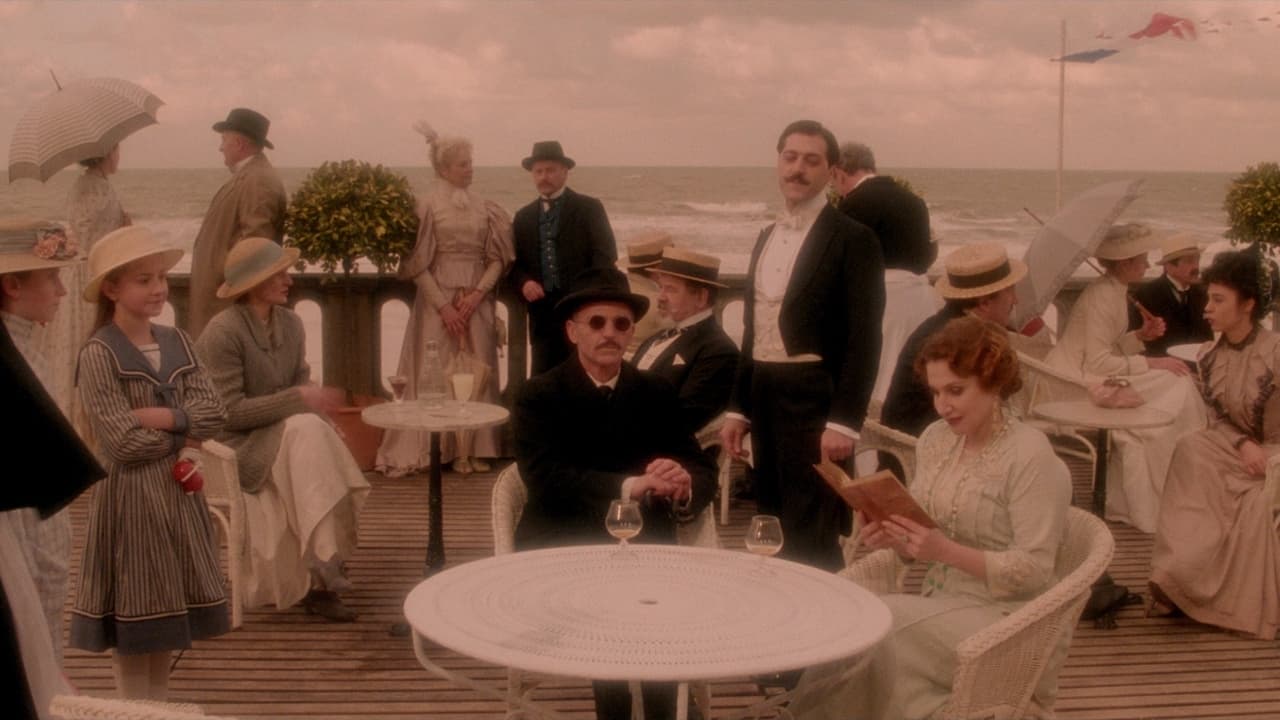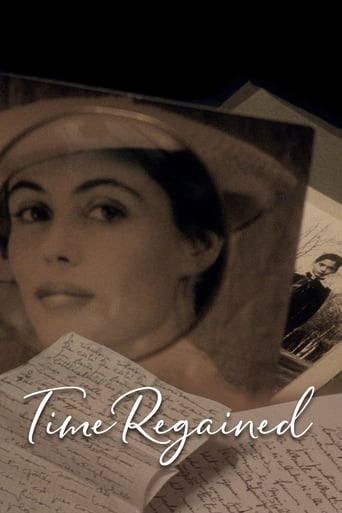Reptileenbu
Did you people see the same film I saw?
Huievest
Instead, you get a movie that's enjoyable enough, but leaves you feeling like it could have been much, much more.
Marva-nova
Amazing worth wacthing. So good. Biased but well made with many good points.
Philippa
All of these films share one commonality, that being a kind of emotional center that humanizes a cast of monsters.
Oslo Jargo (Bartok Kinski)
This film at best, is nothing but amateurish detritus which not only bores the viewer but makes him contemptuously dislike all forms of snobbery or upper middle class portraits.I've read a few of the other reviewers who attempt to become apologists for the director's lack of talent at establishing even a modicum of interest, they say if you haven't read Proust then you will have a difficult time comprehending this, which in itself is entirely fatuous and pomp. Imagine everyone having to read one of the most lurid and over-rated books of the 20th century to see a film which should substantiate itself. What an exaggerated claim. There's no place for "intellectual hubris" or their own "in-group manifesto" here.I had high hopes for this film actually but after the first hour I saw that it was devoid and lacking any duality which would allow us to reflect on what is occurring. It is played by rigid, high handed oafs who are spoiled to begin with.Most of the first hour is infested by artless vignettes which are probably the deluded Proust's memory, and they are reworked in such a disordered way that what comes out is merely a bunch of meaningless, trite and vacuous scenes with banal jargon, not only because they hold absolutely no interest for us, but because they do not invite a further contemplation of what 'time' was to Proust, imagine listening to a bunch of snobs talk about the weather, well, that is what this basically is, how philosophical can one get from that point of reference? It begins to wear thin after the first scene and you pray that there will be no more discussions by those prosaic characters. And it doesn't help that Proust himself is an insipid dandy who parades around in his best suits with his neatly trimmed moustache and becomes a voyeur, if you are asleep already, I don't blame you.Many of the scenes deal with characters which are entirely void of any human warmth or expression, they are petty aristocrats, snobs who sit and drink tea and eat stuffy food while looking down at the poor. They are perverts who visit homosexual brothels and think themselves noble because they hold high office positions during the war while the common man spills his guts out at the front lines. This is a complete waste of time!Malkovich is even an absurd caricature in here, and his little dubbed French voice is entirely insipid. I laughed at most of this. We learn that he is a libertine who likes to visit male brothels and be whipped by sincere proletarian scum, wow, what a revelation on the mystery of human existence. From the looks of the period pieces and the arrangements, it was expensive but that doesn't carry a film with people walking around with no reference to the viewer. Film is supposed to move us in a way, either disgust us or interest us in some form of merit which it presents itself to us in human understanding but boredom to me is no artistic achievement. Don't even bother with this pretentious and ennui filled work.
bjb15
I saw the film in the theater when it first came out. Now, I am viewing it once again on video. Unfortunately, I haven't gotten around to reading any Proust yet. But the film is beautiful. There is one scene in particular at a party I was quite taken by. Marcel is in this very crowded room,, where he seems to know everyone. yet, he seems to feel alone, detached form all the ridiculous social coteries and gossip. he finds comfort in his memories. the sound or smell or sight of something, instantly sends him back in time. he remembers an inconsequential moment. a moment in time when things were better, more bearable. or were they? did we really use our memories as a false comforting, a way to remember one's past as a better time, wishing things could be like that again. i loved the way raoul ruiz filmed it. the camera seems at moments to be floating in the air. at times, it seems the ground where the actors are situated is moving, rather than the camera itself. the acting is wonderful. and the music is eerily touching. a surreally satisfying film.
stark-7
Well I, like many people, have not read Proust. That, however, did not stop me enjoying "Time". I found the film hard to understand, at points slow and bothersome, but when the film made it, it reached out and I was deeply impressed.At points the film stank. I remember two such point, but they only lasted 30 seconds or so each. For the rest of the time I was totally immersed in the film. It had a certain presence that meant even when my sister came instead of her usually silly comments about "silly foeign films" but sat down and watched.This is going nowhere, very much like the film. But ultimately this is going somewhere, like the film. From the beginning, to the end. Inbetween is just sweet ephemera.
Aw-komon
Fans of 8-1/2 and Juliet of the Spirits (Fellini's two most Proustian films by way of Jung) take note: Here's another worthy contender to those two masterpieces. It damn near reaches their level and it sure looks expensive and ultra-authentic, and only time will tell if it holds up as well.
If you've read some Proust (I've only read around a 1000 pages of 'The Guermantes Way' myself and it was at turns the toughest, the most excruciatingly boring and most deeply rewarding reading I've ever inflicted on myself), you will know exactly where this movie is coming from; if you haven't, make plans to read some later, but watch this movie with the knowledge that there is NO STORY IN THE CONVENTIONAL SENSE; it is about how a person's memory works and how and what it chooses to remember and forget and how all these different things effect each other, blah, blah. It aims for the spirit of the books and a taste of what their atmosphere is like, and knows that to even approach this humble end it must, at the very least, begin by pushing the means of the cinema to their limit. It is not stupid enough to think it can equal the intellectual effect of Proustian prose. That would be absurd and impossible. So how does Ruiz's film fare? Suffice it to say that it does not take long to realize that this not a pretentious film but a deeply thought out, planned, and fully realized one. If it manages to capture the spirit of Proustian investigation, it did not do this easily and don't expect to digest it in one or two viewings. You will certainly be immediately impressed though, I'll tell you that much. Be prepared to ACTIVELY participate rather than be DONE TO. There are constant shifts of time period between the different stages of Proust's life and the fully mobile camera never stands still for your convenience.The acting is top notch and multi-faceted all the way and the production design is magnificent. Although it certainly looks very expensive, I can't imagine anyone doing a better job with less, except maybe Truffaut (Jules and Jim) or Renoir (French CanCan). There are plenty of distractions along the way, especially the butt-gorgeous Emmanuel Beart for us helpless men of hetero persuasion, not to mention the jaw-dropping, classical beauty of Chiara Mastroianni in her one scene, which she steals. On second viewing, after having just watched the Coen brothers' ultra-subtle and hilariously clever 'Blood Simple,' I did vaguely detect some weaknesses that someone like Eric Rohmer or Rossellini and Scorsese in their prime would have been careful to authenticate to 3 dimensions; but they weren't noticeable enough to put your finger on right away.I have never seen another Ruiz film before, but I think that the greatest thing he did here was to let Proust's general sense of things, his ultra-cultured neurotic sensibility, become his co-director on the film. I'm sure, at the very least, he made all his actors read the book he was adapting and discussed it with them thoroughly. Just the experience of doing that will enrich the aspirations and imagination of any actor, because Proust's writing is all about going into long analyses of things that may seem trivial at first glance. All I can say is Ruiz really blew me away on this film and I can't wait to see what else he had up his sleeve all these years that I've been missing his movies.

